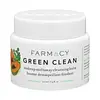Sephora Collection Melting Cleansing Balm with Algae Extract Versus Farmacy Green Clean Makeup Meltaway Cleansing Balm
What's inside
What's inside
 Key Ingredients
Key Ingredients

 Benefits
Benefits

 Concerns
Concerns

 Ingredients Side-by-side
Ingredients Side-by-side

Helianthus Annuus Seed Oil
EmollientGlycerin
HumectantHydrogenated Castor Oil
EmollientPolyglyceryl-3 Caprate
EmulsifyingTribehenin
EmollientWater
Skin ConditioningCoco-Caprylate/Caprate
EmollientBehenyl Alcohol
EmollientPolyglyceryl-4 Caprate
EmulsifyingCaprylyl Glycol
EmollientCocamidopropyl Betaine
CleansingPolyglyceryl-3 Stearate
EmulsifyingMaris Aqua
HumectantTocopherol
AntioxidantSodium Chloride
MaskingHydrolyzed Algin
Sodium Benzoate
MaskingPhenethyl Alcohol
MaskingLaminaria Digitata Extract
Skin ProtectingChlorella Vulgaris Extract
Skin ConditioningSaccharide Isomerate
HumectantCitric Acid
BufferingCI 42090
Cosmetic ColorantHelianthus Annuus Seed Oil, Glycerin, Hydrogenated Castor Oil, Polyglyceryl-3 Caprate, Tribehenin, Water, Coco-Caprylate/Caprate, Behenyl Alcohol, Polyglyceryl-4 Caprate, Caprylyl Glycol, Cocamidopropyl Betaine, Polyglyceryl-3 Stearate, Maris Aqua, Tocopherol, Sodium Chloride, Hydrolyzed Algin, Sodium Benzoate, Phenethyl Alcohol, Laminaria Digitata Extract, Chlorella Vulgaris Extract, Saccharide Isomerate, Citric Acid, CI 42090
Cetyl Ethylhexanoate
EmollientCaprylic/Capric Triglyceride
MaskingPEG-20 Glyceryl Triisostearate
EmollientPEG-10 Isostearate
EmulsifyingPolyethylene
AbrasiveEchinacea Purpurea Root Extract
MoisturisingCarica Papaya Fruit Extract
Skin ConditioningMoringa Oleifera Seed Extract
Skin ConditioningMoringa Oleifera Seed Oil
EmollientZingiber Officinale Root Oil
MaskingHelianthus Annuus Seed Oil
EmollientSorbitan Sesquioleate
EmulsifyingCitrus Aurantifolia Oil
CleansingCitrus Aurantium Bergamia Fruit Oil
MaskingGlycerin
HumectantMelia Azadirachta Leaf Extract
Skin ConditioningMelia Azadirachta Flower Extract
Skin ConditioningCorallina Officinalis Extract
Skin ConditioningCitrus Aurantium Dulcis Peel Oil
MaskingAmber Powder
Cananga Odorata Flower Oil
MaskingCoccinia Indica Fruit Extract
Skin ConditioningSolanum Melongena Fruit Extract
Skin ConditioningCurcuma Longa Root Extract
MaskingOcimum Sanctum Leaf Extract
Skin ConditioningWater
Skin ConditioningButylene Glycol
HumectantDisodium Phosphate
BufferingCitric Acid
BufferingPhenoxyethanol
PreservativeCitral
PerfumingLimonene
PerfumingLinalool
PerfumingCetyl Ethylhexanoate, Caprylic/Capric Triglyceride, PEG-20 Glyceryl Triisostearate, PEG-10 Isostearate, Polyethylene, Echinacea Purpurea Root Extract, Carica Papaya Fruit Extract, Moringa Oleifera Seed Extract, Moringa Oleifera Seed Oil, Zingiber Officinale Root Oil, Helianthus Annuus Seed Oil, Sorbitan Sesquioleate, Citrus Aurantifolia Oil, Citrus Aurantium Bergamia Fruit Oil, Glycerin, Melia Azadirachta Leaf Extract, Melia Azadirachta Flower Extract, Corallina Officinalis Extract, Citrus Aurantium Dulcis Peel Oil, Amber Powder, Cananga Odorata Flower Oil, Coccinia Indica Fruit Extract, Solanum Melongena Fruit Extract, Curcuma Longa Root Extract, Ocimum Sanctum Leaf Extract, Water, Butylene Glycol, Disodium Phosphate, Citric Acid, Phenoxyethanol, Citral, Limonene, Linalool
 Reviews
Reviews

Ingredients Explained
These ingredients are found in both products.
Ingredients higher up in an ingredient list are typically present in a larger amount.
Citric Acid is an alpha hydroxy acid (AHA) naturally found in citrus fruits like oranges, lemons, and limes.
Like other AHAs, citric acid can exfoliate skin by breaking down the bonds that hold dead skin cells together. This helps reveal smoother and brighter skin underneath.
However, this exfoliating effect only happens at high concentrations (20%) which can be hard to find in cosmetic products.
Due to this, citric acid is usually included in small amounts as a pH adjuster. This helps keep products slightly more acidic and compatible with skin's natural pH.
In skincare formulas, citric acid can:
While it can provide some skin benefits, research shows lactic acid and glycolic acid are generally more effective and less irritating exfoliants.
Most citric acid used in skincare today is made by fermenting sugars (usually from molasses). This synthetic version is identical to the natural citrus form but easier to stabilize and use in formulations.
Read more about some other popular AHA's here:
Learn more about Citric AcidGlycerin is already naturally found in your skin. It helps moisturize and protect your skin.
A study from 2016 found glycerin to be more effective as a humectant than AHAs and hyaluronic acid.
As a humectant, it helps the skin stay hydrated by pulling moisture to your skin. The low molecular weight of glycerin allows it to pull moisture into the deeper layers of your skin.
Hydrated skin improves your skin barrier; Your skin barrier helps protect against irritants and bacteria.
Glycerin has also been found to have antimicrobial and antiviral properties. Due to these properties, glycerin is often used in wound and burn treatments.
In cosmetics, glycerin is usually derived from plants such as soybean or palm. However, it can also be sourced from animals, such as tallow or animal fat.
This ingredient is organic, colorless, odorless, and non-toxic.
Glycerin is the name for this ingredient in American English. British English uses Glycerol/Glycerine.
Learn more about GlycerinHelianthus Annuus Seed Oil is the oil derived from the seeds of a Sunflower. Sunflower seed oil is non-fragrant. It is an emollient, meaning it helps to soften the skin.
Sunflower seed oil contains many fatty acids. The fatty acids found in sunflower seeds include (from highest amount to least): linoleic acid, myristic acid, palmitic acid, stearic acid, arachidic acid, oleic acid, and linolenic acid.
These fatty acids help the skin create ceramides. Ceramides play a role in repairing the skin barrier.
Helianthus Annuus Seed Oil helps moisturize the skin. This in turn helps the skin look more rejuvenated and smoother.
Sunflowers are rich in vitamin E.
Historians believe Indigenous cultures of North America domesticated sunflowers before corn. Thus they relied on sunflower oil for a variety of uses. One such use is moisturizing skin and hair.
Sunflower seed oil may not be fungal acne safe. We recommend speaking with a professional if you have any concerns.
Learn more about Helianthus Annuus Seed OilWater. It's the most common cosmetic ingredient of all. You'll usually see it at the top of ingredient lists, meaning that it makes up the largest part of the product.
So why is it so popular? Water most often acts as a solvent - this means that it helps dissolve other ingredients into the formulation.
You'll also recognize water as that liquid we all need to stay alive. If you see this, drink a glass of water. Stay hydrated!
Learn more about Water